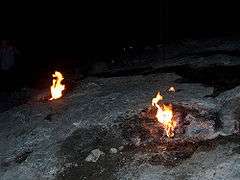Eternal flame
An eternal flame is a flame, lamp or torch that burns continuously for an indefinite period. Most eternal flames are ignited and tended intentionally, but some are natural phenomena caused by natural gas leaks, peat fires and coal seam fires, all of which can be initially ignited by lightning, piezoelectricity or human activity, some of which have burned for thousands of years.
In ancient times, eternal flames were fueled by wood or olive oil; modern examples usually use a piped supply of propane or natural gas. Human-created eternal flames most often commemorate a person or event of national significance, serve as a symbol of an enduring nature such as a religious belief, or a reminder of commitment to a common goal, such as diplomacy.
Religious and cultural significance
The eternal fire is a long-standing tradition in many cultures and religions. In ancient Iran the atar was tended by a dedicated priest and represented the concept of "divine sparks" or Amesha Spenta, as understood in Zoroastrianism. Period sources indicate that three "great fires" existed in the Achaemenid era of Persian history, which are collectively considered the earliest reference to the practice of creating ever-burning community fires.[1]
The eternal flame was a component of the Jewish religious rituals performed in the Tabernacle and later in the Temple in Jerusalem, where a commandment required a fire to burn continuously upon the Outer Altar.[2] Modern Judaism continues a similar tradition by having a sanctuary lamp, the ner tamid, always lit above the ark in the synagogue. After World War II, such flames gained further meaning, as a reminder of the six million Jews killed in the Holocaust.
The Cherokee Nation maintained a fire at the seat of government until ousted by the Indian Removal Act in 1830. At that time, embers from the last great council fire were carried west to the nation's new home in the Oklahoma Territory. The flame, maintained in Oklahoma, was carried back to the last seat of the Cherokee government at Red Clay State Park in south-eastern Tennessee, to the Museum of the Cherokee Indian in Cherokee, North Carolina, and to the Cherokee Nation Tribal Complex in Talequah, Oklahoma.[3]
In China, it has at times been common to establish an eternally lit lamp as a visible aspect of ancestor veneration; it is set in front of a spirit tablet on the family's ancestral altar.[4]
Extinguished flames
- One of the three "Great Flames" of the Achaemenid Empire was extinguished during the reign of Alexander the Great to honour the death of his close friend Hephaestion in 324 BC.
- An eternal flame was kept burning in the inner hearth of the Temple of Delphic Apollo at Delphi in Greece until Delphi was sacked by the Roman general Sulla in 87 BC.[5]
- The Hebrew Bible commands that "The fire shall ever be burning upon the altar; it shall never go out" (Leviticus 6:5,[6] JPS, regarding the altar of Burnt Offering in the Tabernacle, and later the altars in Solomon's Temple and the Second Temple (the latter sacked by Rome in 70 AD). Many churches (especially Catholic and Lutheran), along with Jewish synagogues, feature an eternal flame on or hung above their altars (churches) or Torah arks (synagogues).
- The Sacred fire of Vesta in Ancient Rome, which burned within the Temple of Vesta on the Roman Forum, was extinguished in 394 AD.
- The sacred fire of the Celtic goddess Brigid burned at Kildare, Ireland in pagan times and the fire was continued when the site was Christianised by Saint Brigid in the 5th century AD. It continued burning until the 16th-century Dissolution of the Monasteries.[7][8]
- The eternal flame near the Bronze Soldier of Tallinn in Estonia was extinguished after the country gained independence from the USSR in 1991.
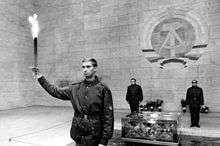
- The eternal flame that was part of the East German "Memorial to the Victims of Fascism and Militarism" at Neue Wache in East Berlin was removed after the 1990 German reunification. In 1993, the space was redesigned without a flame and rededicated as the "Central Memorial of the Federal Republic of Germany for the Victims of War and Tyranny".
- Llama de la Libertad lit by Augusto Pinochet in 1975 in to commemorate the 1973 Chilean coup d'etat against Salvador Allende. It was extinguished in 2004.[9]
- A 23-metre (75 ft) high eternal flame monument named "Večna vatra" was erected in Belgrade in 2000, to commemorate the victims of 1999 NATO bombing of Yugoslavia. The flame was extinguished months later.
Current man-made eternal flames
Europe
Armenia
- Yerevan, in the center of the Armenian Genocide Memorial
Azerbaijan
- Baku, at the Martyrs' Lane in memory of the military and civilian victims of the Black January and Nagorno-Karabakh War
Belarus
- Minsk, at the Victory Square, lit in 1961
- Baranovichi, at the memorial of the fallen during the Great Patriotic War, lit in 1964.
Belgium
- Brussels, at the foot of the Congress Column, surmounting the Tomb of the Unknown Soldier.
Bosnia and Herzegovina
- Sarajevo, the Sarajevo eternal flame (Vječna vatra), in memory of the military and civilian victims of the Second World War
Bulgaria
- Sofia, at the Monument to the Unknown Soldier
Croatia
- Zagreb, in front of the Ministry of Internal Affairs in memory of the police officers killed in the Croatian War of Independence
- Sisak, in Dr. Franjo Tuđman Park, in front of city market and swimming pool, in memory of soldiers fallen in the Croatian War of Independence
England
- Liverpool, at the Anfield stadium, in memorial to those who died in the Hillsborough disaster
Finland
- Helsinki, a lighthouse-like memorial in the suburb of Eira. Originally erected in honour of the Finnish seamen and seafaring. It has later also become a symbol of those who have perished at the sea, the Baltic Sea in particular.[10] A minor controversy arose when the flame was temporarily extinguished, to conserve gas, technically meaning the flame was not an eternal one. It has been relit however.
France
- Paris, under the archway at the Arc de Triomphe, which has burned continuously since 1921, in memory of all who died in World War I.
- Arras, at the Notre Dame de Lorette war memorial.
Georgia
- Tbilisi, at the roundabout and underpass of Hero's Square
Courthouse Square. Tifton, Ga.
Germany
- Berlin, at the Theodor-Heuss-Platz
- Munich, in the Square of the Victims of National Socialism (Platz der Opfer des Nationalsozialismus)
Hungary
- Budapest, in Kossuth Square, commemorating the revolutionaries of the 1956 uprising against control by the Soviet Union
Ireland
- Dublin at the junction of Amiens St and Memorial Road, the Universal Links on Human Rights by Amnesty International, honoring prisoners of conscience
- Dublin, at a new monument to Irish emigrants. On June 18, 2013, a torch from the eternal flame at the John F. Kennedy grave at Arlington National Cemetery was used to light this flame.
Italy
- Madonna del Ghisallo, near Lake Como, for all cyclists who have died
- Rome, on the Altare della Patria, for the Unknown Soldier
Latvia
- Riga, at Brothers' Cemetery or Cemetery of the Brethren (Brāļu Kapi), a military cemetery and national monument memorializing thousands of Latvian soldiers who were killed between 1915 and 1920 in World War I and the Latvian War of Independence. The memorial was built between 1924 and 1936, and designed by sculptor Kārlis Zāle.
Lithuania
- Kaunas, at the Tomb of Unknown Soldier, in the Square of Unity in front of the Vytautas the Great War Museum.
Luxembourg
- Luxembourg, near the Place du Saint-Esprit, in memory of all Luxembourgers fallen in World War II.
Moldova
- Chișinău, a flame dedicated to Chișinău's unknown soldiers who died in World War II
Netherlands
- Amsterdam, at the Hollandsche Schouwburg, in memorial of the Dutch Jewish people who were killed in World War II
- Maastricht, at the Market Square, a statue of Jan Pieter Minckeleers, a Dutch scientist and inventor who discovered illuminating gas (coal gas) and was the inventor of gas lighting.
- The Hague, at the Peace Palace, dedicated to the idea of international peace
Norway
- Oslo, inaugurated on June 9, 2001 at The Pier of Honour, Port of Oslo by Sri Chinmoy and installed permanently at the Aker Brygge complex in 2002. By 2013 however, it was removed from Aker Brygge and reinstalled at Holmenkollen.
Poland
- Warsaw, at the Tomb of the Unknown Soldier
Portugal
- Batalha, at the Tomb of the Unknown Soldier (inside the Batalha Monastery), honoring the Portuguese dead in the World War I, lit April 6, 1921
- Lisbon, at the Monument to the Overseas War Combatants, honoring the dead in the Portuguese Overseas War, lit January 15, 1994
Russia
- Moscow, at the Tomb of the Unknown Soldier in the Alexander Garden to honor the dead of the Great Patriotic War
- Saint Petersburg has three sites with eternal flames. The first is at the Field of Mars in memory of those who died during the Bolshevik Revolution. The second is at Piskaryovskoye Memorial Cemetery in memory of those who perished in World War II during the Siege of Leningrad. At Victory Square, several flames can be seen at the Monument to the Heroic Defenders of Leningrad, in commemoration of the victims and survivors of the Siege of Leningrad.
- Volgograd has two eternal flames. The first is located at Mamayev Kurgan[11] in the Hall of the Warrior Glory in tribute to all those who died defending the city from 1942–1943. The second is located at The Square of the Fallen Fighters[12] on the monument of those who died defending in the Civil and Great Patriotic War
- Kursk has two eternal flames. One is located at the war memorial and the other close to the Triumphal Arch.
- Saratov has two eternal flames: in the Theatre Square and in the Victory Park
- Tambov
- Tolyatti, at the Obelisk of Glory, lit in 1978
- Samara, at the Obelisk of Glory
- Tver has an obelisk and an eternal flame nearby, located on Ploschad Pobedy near the confluence of the rivers T'maka and Volga, to honor the Soviet soldiers who fought against Nazi Germany in the Great Patriotic War (ru:Великая Отечественная война)
- Yekaterinburg, on Kommunarov Square, where dead soldiers were buried in a common grave in 1919. An eternal flame was lit at the site in 1959.
- Omsk, an eternal fire was lit in 1967 on Memorial Square, in honour of fallen soldiers in World War II.
- Severodvinsk
- Ufa has two eternal flames. The first was lit in 1980 in Victory Park, honouring Alexander Matrosov and Minnigali Gubaidullin. The second was lit in 1967, honouring soldiers, who fell fighting for the Soviet Union.
- Salavat, opened in 1981. Honors Salavat citizens, who died during the Great Patriotic War.
- Arkhangelsk, in honor of fallen Northerners in 1941–1945
- Sterlitamak
- Biysk
- Bryansk
- Kovrov
- Kolchugino, located on Lenin Square
- Kaspyisk
- Mahachkala
- Kaliningrad
- Petrozavodsk
- Anapa
- Sochi
- Novy Urengoy
- Oryol, an eternal fire was lit in 1967 on Tankman's Square.
Serbia
- Belgrade, at the Ušće urban neighborhood in memory of the military and civilian victims of the NATO bombing of Serbia
Spain
- Barcelona, Catalonia, at the Fossar de les Moreres (adjacent to the Basílica de Santa Maria del Mar), honouring the Catalans buried there, who died defending Barcelona from those loyal to Philip V on the siege of 1714. The torch with the eternal flame was inaugurated in 2001.
- Madrid, at the Plaza de la Lealtad. The Monumento a los Caídos por España honours all those who have died fighting for Spain.
Switzerland
- Näfels, at the St. Hilarius Parish Church, in atonement for a 14th-century murder.[13][14]
Transnistria
- Tiraspol, a flame dedicated to losses of the War of Transnistria.
Ukraine

- Kiev, in the Glory Park at the Glory Obelisk and the Tomb of the Unknown Soldier, honoring the dead of World War Two.
- Vinnytsia, the Glory memorial.
- Odessa, a monument to the unknown sailor.
North America
Canada
- The Flame of Hope in London, Ontario, at 442 Adelaide Street, where Frederick Banting did theoretical work leading to the discovery of human insulin. It will remain lit until diabetes is cured. It was lit by Queen Elizabeth The Queen Mother in 1989.
- The Centennial Flame in Ottawa, Ontario, first lit in 1967, is in the spirit of an eternal flame; however, it is annually extinguished for cleaning and then relit. It commemorates the first hundred years of Canadian confederation.
- The Centennial Flame on the grounds of the Alberta Legislature Building in Edmonton, Alberta commemorates the same milestone as its counterpart in Ottawa. The flame burns from a metallic cauldron and is located south along the walkway from the south entrance of the Legislature between the south side of Legislature Building Road NW and Fortway Drive NW. Another eternal flame is located on the grounds of the Legislature honours those fallen in the line of duty working for the province.
- The Eternal Flame in the Peace Garden in Nathan Phillips Square in front of Toronto City Hall. It was lit by Pope John Paul II in September 1984 and symbolizes the hope and regeneration of mankind.
- The 2004 Olympic flame remains burning in a memorial park in the Greek town area of Toronto.
United States
- Alabama: Huntsville, Big Spring Park in honor of John F. Kennedy[15] Ignited in 1976, the flame has been extinguished at times for years due to poor maintenance.[16]
- California: Koyasan Buddhist Temple in Los Angeles, where the Peace Flame directly taken from the torch at the Hiroshima Peace Memorial Park in Japan is kept. The flame was brought to Los Angeles in 1989 by Mayor Tom Bradley and has been maintained by the resident priests ever since. University of California, Santa Barbara, houses an eternal flame on its campus. Auburn, on the corner of Fulweiler St. and Nevada St. depicts a soldier carrying a fallen comrade. The statue is named 'Why'. Redlands, in Jennie Davis Park (corner of Redlands Blvd. and New York St.), at the Veterans' Memorial. La Mirada, in front of City Hall to honor the residents who have given their life for their country. Pico Rivera, in front of the civic center, to honor Pico Rivera veterans who died in the line of duty. Oakland, at the O.co Coliseum to honor the late Oakland Raiders owner Al Davis
- Connecticut: New Britain, at the National Iwo Jima Memorial to honor the memory of US servicemen who gave their lives at Iwo Jima.
- Florida: Miami, at Bayfront Park on Biscayne Boulevard, is the Torch of Friendship for John F. Kennedy
- Georgia: Carrollton, at the main entrance of the University of West Georgia, lit at the beginning of each school year; Decatur, at the square downtown, for the Korean War, World War II, and the Vietnam War; Atlanta, at the King Center, for assassinated civil rights leader Martin Luther King Jr.
- Hawaii: Honolulu, to honor victims of the September 11 attacks
- Illinois: Chicago, at Daley Plaza, to honor those who perished in World War II, ignited August 22, 1972, by Albina Nance, president of the Illinois Gold Star Mothers.[17] Highland Park, in the "Freedom's Sacrifice" veterans memorial located on the corner of St. John Ave and Central Avenue to remember the soldiers from Highland Park that gave their lives in the name of freedom. Naperville, on the City's Riverwalk to honor victims of September 11 Attacks. Loves Park, in Holdridge Park on North Second Street to honor all veterans.

- Louisiana: Saint Martinville, at the Acadian Memorial, symbolizing the survival of exiled Acadians as south Louisiana Cajuns.
- Maryland: Emmitsburg, at the National Fallen Firefighters Memorial, on the grounds of the National Fire Academy
- Massachusetts: Springfield, at Forest Park, John F. Kennedy Memorial Flame to honor the memory of President Kennedy. The flame was lit November 22, 1964 on the first anniversary of his death.
- Michigan: Farmington Hills, at the Holocaust Memorial Center in honor of those who perished during the Holocaust. Flint, in Downtown Flint, across from the Durant Hotel, to honor John F. Kennedy
- Mississippi: Mississippi State University, the eternal flame of education
- Missouri: Downtown, Saint Louis, to commemorate the founding of the American Legion in 1919 by Theodore Roosevelt Jr.
- New York: New York City, at Ground Zero, lit by Mayor Michael Bloomberg on the first anniversary of the September 11, 2001, terrorist attacks upon the financial district of the city; St. Clare's Church, honoring 29 parishioners who died as a result of the September 11 attacks in 2001.
- Ohio: Cincinnati at the National Underground Railroad Freedom Center Represents the candles that were placed in the windows of Underground Railroad Supporters. Canton, Garden Center, incorporated into the city's memorial to the memory of President John F. Kennedy, dedicated in 1966. Steubenville, at the Tomb of the Unborn Child, the gravesite of seven aborted fetuses, on the campus of the Franciscan University of Steubenville. Columbus, at Battelle Riverfront Park, to honor fallen members of the Columbus Fire Department. Clinton, at Ohio Veterans Memorial Park. The monument is made up of a large sitting area that is surrounded by benches, a four tier waterfall, a fifty foot wide pond, a black granite POW/MIA monument, an inverted Vietnam War helmet with the eternal flame and a cast steel POW/MIA seal.[18] * Mount Vernon, on the campus of Mount Vernon Nazarene University to honor the commitment to learning and the expansion of knowledge.
- Oklahoma: Oral Roberts University, Tulsa, atop the Prayer Tower, which represents the baptism of the Holy Spirit
- Pennsylvania: Gettysburg Battlefield, in memory of the dead of the American Civil War, first lit by President Franklin Roosevelt in 1938;
- Shanksville, to honor the crew and passengers aboard United Airlines Flight 93 on 9/11 in their efforts to thwart the hijacking. Washington Square, Philadelphia, site of the city's Tomb of the Unknown Soldier of the American Revolution and above the mass grave of thousands of Revolutionary War soldiers.
- South Carolina: Bowman, lit in 1987 in honor and memory of the community's residents who died in World War I, World War II, and the Vietnam War
- South Dakota: Pierre, at the Flaming Fountain (Veterans) Memorial on the shores of Capitol Lake. The flame is part of a fountain.
- Tennessee: The Cherokee maintained a fire at their seat of government, and carried coals to the Oklahoma Territory. Coals from that fire were used to relight the eternal flame at Red Clay State Park, the last seat of the independent Cherokee Nation.[3] The Cherokee People Eternal Flame, located on the Qualla Boundary in Cherokee, North Carolina, is another example of a flame first lit on the Oklahoma Cherokee Reservation and carried as hot coals back to the homeland. Memphis, at the grave of Elvis Presley at his home "Graceland"
- Virginia: John F. Kennedy Eternal Flame in Arlington National Cemetery, lit by Jacqueline Kennedy on November 25, 1963, during the assassinated president's state funeral; Newport News Victory Arch, commemorating American servicemen and women. Lynchburg, gravesite of Jerry Falwell at Liberty University
- Washington, D.C.: at the United States Holocaust Memorial Museum, first lit in 1993 by President Bill Clinton and noted Holocaust survivor Elie Wiesel
Mexico
- The Column of Independence, México City in memory of the heroes of the Mexican Independence War
Nicaragua
- Tomb of Carlos Fonseca in the Central Park of Managua.
South America
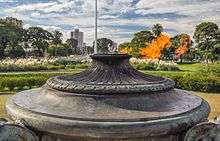

Argentina
- In the Buenos Aires Metropolitan Cathedral in the Autonomous City of Buenos Aires. It was lit in August 17th, 1947 to honor the tomb of General Juan José de San Martín, whose remains rest inside the Nuestra Señora de la Paz chapel; and the soldiers who fought and perished in the wars for Argentina, Chile and Perú's independence from the Spanish crown.
- In the National Flag Memorial (Argentina) in Rosario, Santa Fe.
- In the 'Monument to the dead of the Malvinas War' (Caidos en Malvinas) in Mar del Plata, Buenos Aires.
Brazil
- In the 'Parque da Independência', São Paulo, the Pira da Liberdade marks the site of the independence of Brazil
- Outside the 'Pantheon of Fatherland and Freedom, Tancredo Neves, Brasília, on top of a tower built on the diagonal, burns an eternal flame which represents the freedom of the people and the country's independence.
Colombia
- In the Battle of Boyacá Memorial in Boyacá.
Australia
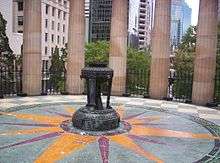
- In the ANZAC War Memorial, Hyde Park in Sydney
- In the Shrine of Remembrance in Melbourne
- In the Shrine of Remembrance in ANZAC Square in Brisbane, Queensland
- At the Australian War Memorial, Canberra, Australian Capital Territory
- At the state War Memorial in Kings Park, Western Australia
- In the Carillon War Memorial located at Bathurst, New South Wales
Asia
India
- New Delhi, India, at the Raj Ghat, in memory of Mahatma Gandhi at the site of his cremation. The date that this flame was first lit is not known at present.
- New Delhi, India, at the India Gate, first lit in 1971 to honor 90,000 soldiers, including an Unknown Warrior, who died in World War I and later conflicts
- Kargil War Memorial, Drass. The eternal flame was lit to glorify the Indian victory of 1999 and to pay homage to martyrs who laid down their lives for the cause of the nation.
- Andaman and Nicobar Islands, India, to remember the victims of the 2004 Asian tsunami, unveiled in 2005
- Shirdi, India, at the Dwarka Mai Mosque, lit by Sai Baba of Shirdi in the late 1800s
- Some ancient temples in south India are known to have eternal flames which have burnt for centuries. Most established temples (such as Tirumala-Tirupati, Mantralayam, etc.) have eternal flames.
- JwalaJi, a famous Shrine of Goddess Durga in North India; where the divine flames are eternally burning.
Israel
- Tel Aviv, at Rabin Square, for assassinated Prime Minister Yitzhak Rabin
- In Jerusalem at Yad Vashem, the national Holocaust-Memorial of Israel
- Near Jerusalem at Yad Kennedy, Israel's memorial to U.S. President John F. Kennedy
Japan
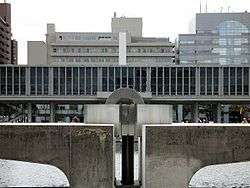
- At the Buddhist temple Daishō-in, at Mt. Misen, Itsukushima, where the flame is said to have been burning since AD 806, for more than 1,200 years[19]
- Hiroshima Peace Memorial Park, to remain lit until all nuclear weapons in the world are abolished[20]
Kazakhstan
- Almaty, the Monument to the Unknown Soldier (from Soviet times)
Kyrgyzstan

- Bishkek, the Victory (Pobedy) Monument on Victory Square
Nepal
- Eternal Peace Flame Lumbini, birthplace of Gautama Buddha,[21] since 1986.
Philippines

- Eternal Flame of Freedom in Corregidor
- Eternal Flame on the grave of former president and dictator, Ferdinand Marcos in the Heroes' Cemetery in Taguig City
South Korea
- At the Peace Gate at Olympic Park, Seoul, South Korea
Turkmenistan
- Türkmenbaşy, the Victory Monument
Africa
Ghana
Zimbabwe
- Harare, Zimbabwe: An eternal flame burns atop the Kopje to commemorate independence.
South Africa
- Pretoria, South Africa: An eternal flame burns in the Voortrekker Monument.
- Johannesburg, South Africa: The flame of democracy burns on Constitution Hill
- Cape Town, South Africa: The Flame of Remembrance for the fallen soldiers and heroes of the struggle burns at the Parliament
Caribbean
Trinidad and Tobago
- Port of Spain: At The Red House, in memory of the lives lost in the 1990 attempted coup[22]
Cuba
- Havana: Memorial to the Soviet Internationalist Soldier
- Havana: Museum of the Revolution in the Granma complex
- Santa Clara: Inside the Che Guevara Mausoleum
- Santa Clara: In the cemetery beside the Che Guevara Mausoleum complex
Naturally fueled flames
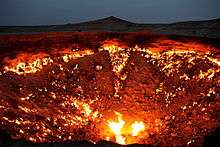
Fueled by natural gas
- At Yanartaş in the Olympos National Park in Turkey, natural gas burns from many vents on the side of the mountain. It is thought to be the location of ancient Mount Chimaera. This is the largest venting of abiogenic methane on Earth's terrestrial surface,[23] and has been burning for over 2500 years. The flames were used in ancient times as a navigation beacon.
- The Eternal Flame Falls, featuring a small natural gas-fueled flame that burns behind a waterfall, can be found in Chestnut Ridge Park in Western New York, United States.
- There is an eternal flame in Guanziling, Taiwan, as a result of methane gas.
- Flaming Geyser State Park in Washington, United States.
- An area in India's Great Himalayas, worshiped by Hindus as Jwala Devi Temple, or Jwalamukhi Devi Temple, produces natural spontaneous flames and is said to have been doing so for thousands of years.
- The Darvaza gas crater fire, near Derweze, Turkmenistan, is a large hole leaking natural gas that has been burning since 1971.
- An eternal flame near Kirkuk, Iraq, known to the locals as Baba Gurgur, is said to have been burning for thousands of years.
- An eternal flame is found at the Yanar Dag mud volcano in Azerbaijan.
- In the central Javanese village of Manggarmas in Indonesia, the Mrapen is a famous natural gas-fueled eternal flame originally ignited sometime before the 15th century Demak Sultanate era; it has never died out despite intense tropical rain and winds. It is said that the sacred kris heirloom dagger of Demak Sultanate were forged in this flame.[24] The Mrapen flame, considered sacred in Javanese culture, is used in an annual Waisak Buddhist ceremony, brought to Mendut and Borobudur temple. It was also used in several torch relays for sport events such as Pekan Olahraga Nasional held every four years, 1997 Southeast Asian Games, 2008 Asian Beach Games, 2011 Southeast Asian Games, and 2018 Asian Games.
Fueled by coal seams
- A coal seam-fueled eternal flame in Australia known as "Burning Mountain" is claimed to be the world's longest burning fire, at 6,000 years old.[25]
- A coal mine fire in Centralia, Pennsylvania, has been burning beneath the borough since 1962.
- Laurel Run mine fire
- A coal field fire in Jharia, India, is known to have been burning for almost a century.
See also
References
- ↑ Takht-e Sulaiman – UNESCO World Heritage Centre
- ↑ Leviticus 6:12: "And the fire upon the altar shall be burning in it; it shall not be put out: and the priest shall burn wood on it every morning, and lay the burnt offering in order upon it; and he shall burn thereon the fat of the peace offerings" Biblos Cross-referenced Holy Bible (King James version)
- 1 2 From the First Rising Sun: The Real Prehistory of the Cherokee People and Nation According to Oral Traditions, Legends, and Myths. Charla Jean Morris. Author House, Bloomington, IN: 2011. Page xvii.
- ↑ "Settling the Dead: Funerals, Memorials, and Beliefs Concerning the Afterlife". Asia for Educators, Columbia University. Retrieved 2010-05-04.
- ↑ Noted by Pausanias (10.24.5) in the second century CE and earlier mentioned by Herodotus (7.141) and Euripides (Iphigeneia in Tauris)
- ↑ "Vayikra (Leviticus): Chapter 6". Jewish Virtual Library.
- ↑ http://www.kildare.ie/community/notices/perpetual-flame.asp
- ↑ https://voicesfromthedawn.com/kildare-round-tower-and-fire-temple/
- ↑ "Apagan la "Llama Eterna de la Libertad" encendida por Pinochet". ABC Color (in Spanish). October 19, 2004. Retrieved February 22, 2013.
- ↑ "Merenkulkijoiden ja mereen menehtyneiden muistomerkki". Julkiset veistokset (in Finnish). Helsingin kaupungin taidemuseo. Retrieved December 10, 2014.
- ↑ Eternal fire at Mamayev Kurgan – photo
- ↑ Eternal fire at The Square of the Fallen Fighters in Volgograd – photo
- ↑ Wallace, Ellen (December 22, 2012). "Eternal flame in Canton Glarus may go out". Geneva Lunch. Retrieved 2012-12-22.
- ↑ Krummenacher, Jörg (December 22, 2012). "Keine Versöhnung vor dem ewigen Licht". Neue Zürcher Zeitung. Retrieved 2012-12-22.
- ↑ "Tomb of the Unknown Soldier". UShistory.org. Independence Hall Association. Archived from the original on January 11, 2015. Retrieved December 14, 2014.
- ↑ Glenn D. Porter (August 31, 2004). "Eternal Flame Is Out, But Who Cares?". Philly.com. Retrieved December 14, 2014.
- ↑ "Eternal Flame: Daley Plaza, Chicago, Illinois, 60601". Chicagoarchitecture.info. Retrieved December 14, 2014.
- ↑ "POW/MIA Reflection Pond and Eternal Flame". Ovmp.org. Ohio Veterans Memorial Park. Retrieved April 14, 2015.
- ↑ Nihonsankei. "Miyajima". The three most scenic spots in Japan. Archived from the original on December 15, 2007. Retrieved June 25, 2007.
- ↑ Hiroshima Peace Memorial Museum (2000). "Guided Tours to Peace Memorial Park and Vicinity". Hiroshima Peace Site. Retrieved 2007-06-25.
- ↑ "Things to do in Lumbini". BBC. Retrieved 2012-12-23.
- ↑ "The Red House". Parliament of Trinidad and Tobago. Retrieved August 6, 2016.
- ↑ Hosgormez, H.; Etiope, G.; Yalçin, M. N. (November 2008). "New evidence for a mixed inorganic and organic origin of the Olympic Chimaera fire (Turkey): a large onshore seepage of abiogenic gas". Geofluids. 8 (4): 263–273. doi:10.1111/j.1468-8123.2008.00226.x. Retrieved July 17, 2011.
- ↑ "Obor SEA Games XXVI Mulai Diarak dari Mrapen" (in Indonesian). Tempo Interaktif. October 23, 2011. Retrieved 2011-11-07.
- ↑ Krajick, Kevin (May 2005). "Fire in the hole". Smithsonian Magazine. Smithsonian Institution: 54ff. Retrieved 2006-10-24.
External links

